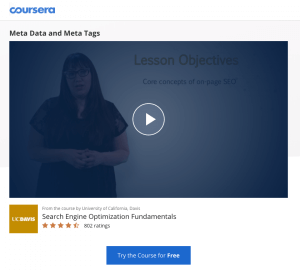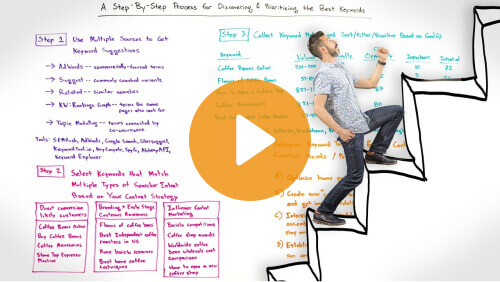An important SEO fundamental is using keywords that your target audience actively search. Here’s how to find them!

What Search Engines look for changes and improves year after year, leading to better user experience – and confused marketing personnel who wonder what changed.
However, it turns out you can consistently improve your sites ranking for keyword searches by following some tried and true, and some cutting edge methods.
And in today’s post, we’re going to show you, with videos from SEO experts, how to find and use the right keywords, to improve your search result rank, and get that traffic coming in.
With not a single mention of your Grandpa’s keyword density!
December 2024 Offer – For a Limited Time Only:
Get WordPress SEO Keyword Hound Plugin for 25% off! Don’t miss out!
Finding that all important keyword
As finding the right keyword or key phrase is the most important thing, the place where you research keywords is paramount!
Starting From Scratch
In this video Brian Dean (of Backlinco.com) takes you step by step through his own approach to keyword research and picking the right one.
Knowing what your customer searches for and how they phrase that search brings you to the top of search engine ranking. Knowing the trends in searches for those keywords informs you whether to go for one or the other if you are torn between two.
Dean solidly sticks to whitest techniques. Meaning he is focussed on his own content and making it better. Instead of being focussed more on the competition and bearing them. Speaking of…
Understanding (and Crushing) Competition
Neil Patel gives another take on finding keywords, his being more focused on what your competition are doing -Then beating them at their own game.It is important to note that Patel’s approach is better suited to already existing sites that are being outranked.
Tailoring your sites approach from either template can work. Which approach works best depends on the culture of your site and the nature of your competition.
What is important is the research is done!
Latent Semantic Indexing (LSI)
LSIs are synonyms and closely related words to your keyword.
Search Engines use LSI to look for both relevance, and quality.
Ashley Faulkes has made an excellent video detailing LSI and why it is important for SEO.
It has become increasingly important due to most search engines focusing on quality of search results being relevant to what users are searching for.
For example, let’s pretend we post two blog entries about Star Wars: one with references to characters and ship names and one without. The first would rank higher in search engines as that is the entry that is more relevant to the search.
Finding Related Keywords, everybody do the Keyword shuffle!
The keyword shuffle is a technique for finding related keywords using nothing more than a search engine, with auto-predict or suggestions turned on.
You type your keyword then leave a space, and type the letters of the alphabet one at a time to produce related words. Or use the same technique for the word preceding the keyword.
This works especially well on Google due to it using LSIs to generation suggestions.
Traffic Research, a bespoke channel, have created this short video tutorial about how exactly to use the technique.
Using the technique can also produce some surprising and humorous results.>Taking the name of our company, using this technique and typing “Creative Minds a” into google, the top generated suggestion is “Creative Minds are rarely tidy”…. Make of that what you will!
But those surprising and humorous results does make keyword research a more interesting and rewarding process.
Should I be Using Stop Words
Stop words are words in a keyword that are normally used to make a sentence grammatically correct.
The question is, should you include them in your keywords so it becomes more of a keyphrase?
The answer, as always, is it depends. Sometimes addition of a stop word can change the meaning of a sentence.
Ask Yoast have produced a video that gives an excellent example from the travel and hotel world.
This is important for use with local businesses. Lets pretend we have a restaurant called cafe Paris, in Seattle. The position of that stop word can drastically change that websites ranking. As you could probably imagine, “cafe in Paris” and “cafe Paris” would result in our hypothetical site being lost in pages of travel sites.
The addition of the city our restaurant, either using the word “in” or using bracketing (Seattle) would result in a significantly higher ranking for those search terms.
Then the only issue for our restaurant would be becoming famous enough locally that people search for those terms!
Meta Data and Meta Tags, Meta Useful
When a user inputs a new search term, search engine bots look for is keywords in the title of the page and its description.
In this video, Coursera breaks down and explains both elements in detail.
This is of paramount importance to SEO, as without it search bots have to look within the page itself for keywords.
It may seem obvious at first, but without being able to find the keywords easily, a page, no matter how good its content, can get lost within thousands of search results.
Don’t forget that URL!
Related to Meta Data and Meta Tags, inserting keywords into the URL of new pages aids SEO
Etraffic breaks down how this works and its advantages.
With a keyword in the URL of pages, search results featuring those pages receive a higher rank, even if the main websites URL does not state that keyword.
As an example: I was thinking of buying my young, cat obsessed niece a gift for her 6th birthday, and searching for a cat lamp returns this wonderful idea, with options from etsy, amazon and ebay!
All URLs actually contain the keyword, or synonyms for the keyword.
Remember, Content is King!
So, you’ve found a fantastic keyword that has loads of searches, and it just so happens to match your site. You’ve got that keyword in both title, and meta description, but you could still rank higher. There is more SEO we can do with that site.
Good content is vital! It allows search engines to locate relevant pages for what people search for, but also a well written article that keeps its reader engaged, keeps them on the page and likely to click through to another page, or share it, makes search engines happy.
Happy Search Engines mean a higher ranking.
Marley Baird provides some excellent tips here, for incorporating keywords and LSI keywords into an article. And not spamming or overusing them!
For instance, why having the keyword in the first paragraph grabs the attention of the search engine and readers, making sure readers know they are viewing something that is relevant to them.
Moz Complete Summary of Process
Moz produce a superb tool for SEO. They also produce a interesting YouTube channel which covers potential uses for their app.
In this video not breaks down their method for finding and l, perhaps far more importantly picking the right keywords. Identifying possible opportunities along the way. With some shameless self promotion!
As you can see moz focus is even more data driven. This is possibly due to them developing their own outstanding app that can help enormously in this area.
Finding then choosing then using the right keyword are the key skills of anyone working with SEO.
Fortunately there are several methods for generating keywords and these are not mutually exclusive or unchangeable.
Got your own method for finding and choosing keywords? Let us know!











